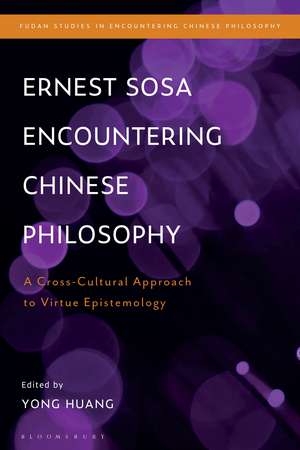Ernest Sosa Encountering Chinese Philosophy: A Cross-Cultural Approach to Virtue Epistemology: Fudan Studies in Encountering Chinese Philosophy
Editat de Prof. Yong Huangen Limba Engleză Paperback – 26 iul 2023
| Toate formatele și edițiile | Preț | Express |
|---|---|---|
| Paperback (1) | 191.92 lei 6-8 săpt. | |
| Bloomsbury Publishing – 26 iul 2023 | 191.92 lei 6-8 săpt. | |
| Hardback (1) | 540.31 lei 6-8 săpt. | |
| Bloomsbury Publishing – 12 ian 2022 | 540.31 lei 6-8 săpt. |
Preț: 191.92 lei
Preț vechi: 249.67 lei
-23% Nou
Puncte Express: 288
Preț estimativ în valută:
36.74€ • 39.92$ • 30.88£
36.74€ • 39.92$ • 30.88£
Carte tipărită la comandă
Livrare economică 21 aprilie-05 mai
Preluare comenzi: 021 569.72.76
Specificații
ISBN-13: 9781350265813
ISBN-10: 1350265810
Pagini: 256
Dimensiuni: 156 x 234 x 25 mm
Greutate: 0.37 kg
Editura: Bloomsbury Publishing
Colecția Bloomsbury Academic
Seria Fudan Studies in Encountering Chinese Philosophy
Locul publicării:London, United Kingdom
ISBN-10: 1350265810
Pagini: 256
Dimensiuni: 156 x 234 x 25 mm
Greutate: 0.37 kg
Editura: Bloomsbury Publishing
Colecția Bloomsbury Academic
Seria Fudan Studies in Encountering Chinese Philosophy
Locul publicării:London, United Kingdom
Caracteristici
Includes a commentary from Ernest Sosa, a major analytic philosopher, in which he responds to the critical questions raised about his virtue epistemology
Notă biografică
Yong Huang is Professor of Philosophy at The Chinese University of Hong Kong, Hong Kong.
Cuprins
1. Introduction: Ernest Sosa Encountering Chinese Philosophy, Yong Huang (Chinese University of Hong Kong, Hong Kong)2. Xunzi, Zhuangzi, and Virtue Epistemology, Kim-chong Chong (Hong Kong University of Science and Technology, Hong Kong)3. Epistemic Competence and Agency in Sosa and Xunzi, Chris Fraser (University of Hong Kong, Hong Kong)4. In Favor of a Comprehensive Virtue Epistemology? Gregor Paul (Karlsruhe Institute of Technology, Germany)5. Detachment: A Trait-Reliabilist Virtue in Linji's Chan Buddhiism, Tao Jiang (Rutgers University, USA)6. Apt Performances as Unity of Knowledge and Action: A Comparative Study of Ernest Sosa's Virtue Epistemology and Wang Yangming's Meta-Ethics, Xiang Huang (Fudan University, China)7. Hearer's Conditions for Accepting Testimony, Winnie Sung (Nanyang Technological University, Singapore)8. Sosa's Reflective Knowledge and Xunzi's Knowledge of the Dao, Leo K. C. Cheung (Chinese University of Hong Kong, Hong Kong)9. Epistemic Virtues, The Gettier Problem, and the Rectification of Names, Yingjin Xu (Fudan University, China)10. Sosa's Reliabilist Reading of Davidson and Zhuangzi's Way Out of Ontological Predicament, Yiu-ming Fung (Tunghai University, Taiwan)11. Resurrecting Daoist Virtuosity Epistemology, Chad Hansen (University of Hong Kong, Hong Kong)12. A Third Platonic Problem for Sosa? Or How Wang Yangming Can Know Better than Full Well? Yong Huang (Chinese University of Hong Kong, Hong Kong)13. Responses, Ernest Sosa (Rutgers University, USA)Index
Recenzii
This volume breaks new ground in comparative philosophy! It brings together renowned virtue epistemologist Ernest Sosa and leading scholars of Chinese philosophy for constructive and nuanced engagement in cross-cultural epistemology. The outcome is philosophically refreshing and scholarly fruitful. I highly recommend it to everyone interested in the topic.
Sosa's reliabilist virtue epistemology has sharpened our understanding of knowledge's accuracy, adroitness and aptness. Here, Yong Huang curates a valuable anthology that stretches these ideas; leading scholars critically assess reliabilist intellectual virtue in light of agency in the Confucian, Daoist and Buddhist philosophical traditions. This is contemporary, cross-tradition epistemology at its best!
Sosa's reliabilist virtue epistemology has sharpened our understanding of knowledge's accuracy, adroitness and aptness. Here, Yong Huang curates a valuable anthology that stretches these ideas; leading scholars critically assess reliabilist intellectual virtue in light of agency in the Confucian, Daoist and Buddhist philosophical traditions. This is contemporary, cross-tradition epistemology at its best!

